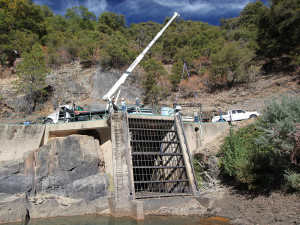Wednesday March 6, 2013
 Fish monitoring sometimes encounters design and fabrication challenges. One such challenge: how to detect Passive Inductive Transponder (PIT) tags inside two large hydropower diversion tunnels. FISHBIO personnel used experience and ingenuity to build two giant antenna arrays that can operate inside the tunnels, which divert water into a reservoir for hydroelectric power generation. The arrays had to be sensitive enough to detect the 12 mm and 23 mm PIT tags of individual rainbow trout getting swept through the tunnels. They also had to be strong enough to withstand the intense forces within the tunnels, where velocities can reach nearly 10 feet per second and discharges can reach up to 1,000 cubic feet per second. Crews also needed to be able to remove the antennas when cleaning the tunnel trash grates to let debris flush through. The FISHBIO crew developed a unique design and constructed two massive, freestanding fiberglass arrays, 12 feet and 14 feet in height to fit their respective tunnels. Each array consists of three antennas stacked on top of each other, spaced like the rungs of a ladder. Since installation, the arrays have passed the test: they can withstand formidable flow events, and successfully detect more than 90% of passing tags.
Fish monitoring sometimes encounters design and fabrication challenges. One such challenge: how to detect Passive Inductive Transponder (PIT) tags inside two large hydropower diversion tunnels. FISHBIO personnel used experience and ingenuity to build two giant antenna arrays that can operate inside the tunnels, which divert water into a reservoir for hydroelectric power generation. The arrays had to be sensitive enough to detect the 12 mm and 23 mm PIT tags of individual rainbow trout getting swept through the tunnels. They also had to be strong enough to withstand the intense forces within the tunnels, where velocities can reach nearly 10 feet per second and discharges can reach up to 1,000 cubic feet per second. Crews also needed to be able to remove the antennas when cleaning the tunnel trash grates to let debris flush through. The FISHBIO crew developed a unique design and constructed two massive, freestanding fiberglass arrays, 12 feet and 14 feet in height to fit their respective tunnels. Each array consists of three antennas stacked on top of each other, spaced like the rungs of a ladder. Since installation, the arrays have passed the test: they can withstand formidable flow events, and successfully detect more than 90% of passing tags.
